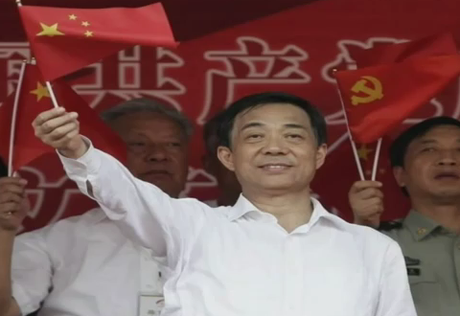
Bo Xilai, man of the people?
In the most sensational political scandal to rock China in this century, prominent and polemic politician Bo Xilai was sacked from his position as Communist Party chief of Chongqing, one of the biggest cities in China, on Wednesday.
It was a simple announcement, but one that has rocked both the Chinese political establishment and Western observers’ expectations: Bo’s removal ended what appeared to be his surefire ascent to the upper echelons of China’s political power. He is being replaced by Vice Premier Zhang Dejiang, a North Korean-trained economist who is, media reports claim, a party man through and through. And though not specifically mentioned in statements on Chinese state media, Bo’s sacking comes after a political scandal involving his longtime friend and vice mayor, Wang Lijun, who fled to a US consulate a few weeks ago, possibly to seek political asylum, under uncertain circumstances. Said The Washington Post, Wang’s “flight to a foreign consulate represented a potential breach of sensitive internal information, violating party discipline and tainting Bo.”
“[Bo's] confidence in public, bordering on flamboyance, and his ease with the media clashed with the low-key, collegial and bland style preferred by the Chinese leadership. Ever since charismatic, populist Mao Zedong mired China in poverty and political chaos, his successors have worked to make sure no one person would dominate,” The Washington Post explained. “Instead, rule would be by consensus among members of a collective leadership. Bo was a threat to that balance.”
Who is Bo Xilai? A gifted politician, charismatic salesman and a devotee of Mao, Bo began his career as mayor of the seaside city of Dailan, where he transformed the city into a bustling port through the pursuit of foreign investment. He then moved on to Chongqing, where he launched his signature campaigns: Cracking down on corruption and gangs. The controversial “smash the black” anti-gang crackdown “resulted in 2,000 arrests, 500 prosecutions, and 13 executions, including the former director of the city’s Judicial Bureau, and a wave of nationwide publicity,” according to The Washington Post. But as his political star rose, so too did criticism of his tactics – legal scholars claimed that he and Wang ignored due process, while businesses claimed they were being targeted for shakedowns. At the same time, Bo worked to solidify his image as a man of the people, starting with the singing of Communist party “red songs”, mass sing-alongs that took place in Chongqing parks.
Lessons to be learned. Wenran Jiang in Canada’s Globe and Mail saw two major lessons to be learned from Bo’s downfall: “First, that there are still very few rules in the non-transparent world of Chinese politics… There is no playbook,” as China struggles to transition political power to the post-revolutionary generation. And second, “that Western coverage of Chinese politics has been consumed by elites – a narrow focus on internal power struggles and factions, often reduced to a horse race. This misses the bigger picture of the challenges facing modern China: growing inequality, rampant corruption and the difficult transition to a new development model, among others.” Bo emphasized equal distribution of wealth and positioned himself as anti-corruption, a campaign that brought down many powerful people and made him a rather populist figure, despite his “princeling” pedigree.
Down but not out? Chris Devonshire-Ellis, who has known Bo for more than 15 years, wrote on China Briefing that the situation is embarrassing for both Bo and the Chinese Communist Party, “But with him being the son of one of China’s communist immortals, Bo Yibo, and a history of playing hard ball with some of the CCP’s most tried and tested theories, it’s hard to say whether Bo Xilai is truly out for the count…. whether Bo will accept a graceful retirement and being put out to grass doesn’t entirely fit the character of the man – or that of his eminent father either. There is revolutionary blood in those veins, and I’m not entirely sure – barring any massive corruption scandal still to unfurl – that we have seen the last of Bo Xilai.” Others noted that Bo may have started something bigger than himself, especially with his emphasis on the equal redistribution of wealth and tapping into a more romantic vision of China’s red history: “Mr. Bo is down personally, but his initiatives and style, controversial as they are, have a huge following,” Wenran noted in the Globe and Mail. “The test for China’s leadership is how to move the political reform agenda forward, beyond the rhetoric.”
Bo’s mistake. Bo was beloved by the people of Chongqing and Dailan, but that, even combined with his “impeccable political pedigree as the son of one of the Communist party’s founding members”, didn’t make him untouchable, wrote The Telegraph’s Malcolm Moore from Beijing. “In fact he had no shortage of enemies within the party. Some were annoyed at his successes, all trumpeted loudly in the media. Others were irritated at the personality cult that he built for himself, and at his lack of respect for the party’s strict hierarchy. While China’s other leaders remain deliberately low-key, wherever Mr Bo appeared, he was cheered like a celebrity. In the end, though, his star burned too brightly. When Mr Bo ran into trouble, he did not have any supporters who would risk their necks for him, especially in a year of political transition.” What he does next is anyone’s guess.
More on China
- China’s heir apparent visits US
- Little new emerges from US-Sino talks
- US forges new “special relationship” with Australia – to counter China
- China, Russia veto UN Security Council resolution on Syria

